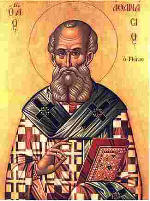
The Paradise Of The Holy Fathers Volumes 1 and 2 by Saint Athanasius Of Alexandria
CHAPTER XXIII
OF HERO THE ALEXANDRIAN [BISHOP OF DIOSPOLIS ABOUT A
D
365]
AND there was also my neighbour, a man whose name was Ahrôn (Hero), who was by race an Alexandrian; now his early manhood was exceedingly glorious, and he was enlightened in his mind, and his intellect was keen, and the habits of his life were pure. This man, I say, after [performing] many labours was also seized by the passion of boasting and pridefulness, and he wavered and fell; and he evolved in his mind and imagined great things against the fathers, and he reviled also the blessed Evagrius, saying, “Those who allow themselves to be persuaded [into accepting] thy doctrine certainly go astray and err, for [men] require no other teacher than Christ.” And he put forward and urged in witness of his words, with foolish intent, the speech from the Gospel (which our Redeemer also spake), “Ye shall call no man master on the earth” (St. Matthew 23:8). And his understanding became so greatly blinded that at length on him also iron fetters fell, and he was fast bound, because he would neither be persuaded nor would he receive or be a partaker of the Holy Mysteries, although he loved the truth greatly. Now, the food upon which he lived was too little and the habits of his life were immeasurably strict, for, according to what those who were continually with him used to relate, on several occasions he only partook of a meal once in three months, the participation in the Mysteries only being sufficient for him; but if it happened that he came across some wild herbs by chance [he would eat them].
Now I myself, with the blessed man Albinus, received an experience of him when we were going to Scete. Scete was forty miles distant from us, and we partook of two meals and drank water three times [on the way], whilst he tasted nothing at all during his journey with us. He travelled on foot, and he was repeating [passages] from the Scriptures by heart; during the time that he went with us, he repeated [passages] from the Scriptures and sang fifteen Psalms, and he repeated the Beatitudes and the Epistle to the Hebrews, and [the book of] Isaiah the Prophet, and a portion of Jeremiah, and after [that] the Gospel of [Saint] Luke, and after [that] the Proverbs; and in spite of all this we were unable to overtake him as he trudged along. Now therefore this man was at length persecuted by lust as by a fire, and he was never again able to dwell in his cell, but he went to Alexandria, and by reason of his pride it happened unto him, through Divine Providence, even as it is said, “One good is rooted up by another.” Nevertheless, having fallen willingly into a state of indifference, he finally found redemption. Now he was present continually at the shows of the theatres and circuses, and he was never absent from the public drinking rooms of the taverns; and thus whilst he was leading this life of prodigality and drunkenness he fell and was brought to a standstill in the miry ditch of the lust of women. At length he went to one of those women who are at the head of the grade of harlots, and because of his passion with all boldness he held converse with her, and these things having thus been done by him there broke out in the place of his nature a carbuncle which grew with great vigour, and his sickness waxed sore upon him for a space of six months, and his members rotted away and they had to be cut off. By these means he became finally cured, but he remained without members; and afterwards he went back again to the integrity of [his] nature, and to divine thoughts. [And he came to the desert] and confessed all these things to the fathers, and though he remained not a long time [there] he did not flee from leading the ascetic life, nor from weeping because of what had happened to him, nor from offering up the repentance which was meet. And after a few days he died and departed from this world.
Copyright ©1999-2023 Wildfire Fellowship, Inc all rights reserved

 Keep Site Running
Keep Site Running